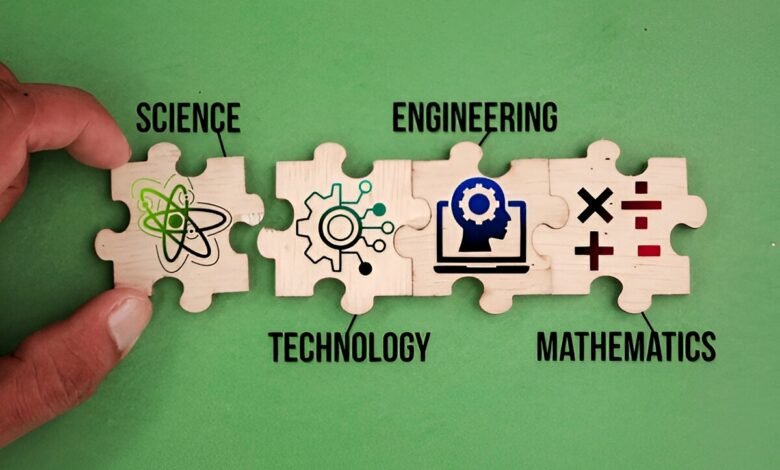The Role of STEM Education in Pakistan’s Tech Growth
This article explores the vital role that STEM education plays in Pakistan’s technological growth and its potential to reshape the country's future.

Pakistan is experiencing a technological awakening, driven by a young, digital-savvy population and increasing global interest in its tech ecosystem. As the country moves toward a knowledge-based economy, STEM education in Pakistan—covering science, technology, engineering, and mathematics—has emerged as a crucial pillar for sustainable, tech-driven development. The success of the nation’s tech industry hinges on a workforce that can think critically, solve complex problems, and innovate. This article explores the vital role that STEM education plays in Pakistan’s technological growth and its potential to reshape the country’s future.
What is STEM Education and Why It Matters
STEM education is an interdisciplinary approach that integrates four foundational areas—science, technology, engineering, and mathematics—to develop practical, future-ready skills. It goes beyond rote learning, encouraging students to apply knowledge in real-world contexts. In today’s digital age, STEM is not just a buzzword—it is a necessity.
Countries investing in STEM are rapidly advancing in sectors like AI, robotics, biotechnology, and sustainable energy. For Pakistan to compete globally and address domestic challenges such as job creation and automation, it must equip its youth with robust STEM education. This approach nurtures curiosity, resilience, and creativity—qualities essential for entrepreneurship and tech innovation.
Current State of STEM Education in Pakistan
Despite its importance, the state of STEM education in Pakistan remains uneven. Public schools often struggle with outdated syllabi, undertrained teachers, and a lack of practical learning facilities. Many students, especially in rural areas, are deprived of even the basic infrastructure to support scientific education.
On the other hand, private schools in urban areas are increasingly integrating coding, robotics, and tech labs into their curriculums. Some institutions, like The Lyceum, Roots Millennium, and Bay View High School, are leading the way. However, these advancements are accessible only to a small fraction of the population.
Efforts are being made to revamp the curriculum through the Single National Curriculum (SNC), but its effective implementation and alignment with STEM best practices remain questionable.
Government Initiatives and Policies
The government of Pakistan has acknowledged the significance of STEM education in fostering national development. Various initiatives have been introduced, such as
-
Pakistan Science Foundation (PSF)—Running STEM promotion programs across schools.
-
Ministry of IT and Telecom—Supporting ICT-based learning through the Digital Pakistan Policy.
-
HEC’s STEM Talent Hunt Program—Encouraging university students to engage in research and innovation.
-
Establishment of National Centers of Artificial Intelligence, Robotics, and Cyber Security—Facilitating academic-industrial collaboration.
Despite these promising steps, the budget allocation for education and R&D remains among the lowest in the region, which hampers the scalability and sustainability of these initiatives.
Role of Private Sector and Startups in STEM Advancement
The private sector is stepping in where the public sector falls short. EdTech startups in Pakistan are leveraging digital platforms to deliver STEM content in innovative ways:
-
SABAQ—Creates engaging animated STEM content in local languages.
-
Taleemabad uses gamification to teach science and math through its award-winning app.
-
Edkasa—Offers test prep and STEM tutoring via mobile devices, reaching underserved areas.
Tech companies like Careem, Jazz, and Systems Limited are also contributing through CSR campaigns that promote digital literacy, sponsor hackathons, and establish coding bootcamps.
These initiatives are democratizing STEM access and sparking curiosity among students beyond the conventional classroom setup.
Women in STEM: Closing the Gender Gap
A tech-driven economy must be inclusive—and that means actively involving women in STEM fields. Sadly, gender disparity in STEM education in Pakistan remains a serious concern. Cultural norms, limited role models, and biases in teaching environments hinder girls from pursuing careers in technology and science.
However, change is on the horizon:
-
Women Engineers Pakistan advocates for gender equity in technical institutions.
-
CodeGirls Karachi offers coding bootcamps and mentorship exclusively for women.
-
She Loves Tech Pakistan is encouraging female-led startups through national pitch competitions.
Empowering women in STEM not only accelerates tech innovation but also ensures social equity and broader economic growth.
STEM and Pakistan’s Emerging Tech Ecosystem
Pakistan’s startup ecosystem is thriving, with increased investment in AI, fintech, IoT, and e-commerce. Much of this momentum is fueled by STEM-trained individuals from universities like NUST, FAST-NU, LUMS, and GIKI.
Key areas where STEM talent is making an impact:
-
Software Development: From freelance coding to app development.
-
Artificial Intelligence: Powering smart systems in health tech and agriculture.
-
Robotics and IoT: Used in security, logistics, and manufacturing.
-
Cybersecurity and Data Science: In demand across financial institutions and telecom sectors.
The synergy between STEM education and Pakistan’s digital economy is evident. The more we invest in developing technical skills, the faster we can scale innovation.
STEM Education and Economic Development
The link between STEM education and economic development is undeniable. A digitally literate population enhances national productivity, boosts exports (especially in IT services), and reduces unemployment. STEM skills empower youth to become job creators, not just job seekers.
With over 64% of the population under 30, Pakistan has a demographic advantage. Harnessing this youth potential through STEM education can lead to massive gains in GDP and innovation metrics. Nations like India and China have already demonstrated this with their tech revolutions.
Challenges in Scaling STEM Education Nationwide
Scaling STEM education across Pakistan poses several challenges:
-
⚠️Infrastructure Deficit: Many schools lack labs, internet access, and even electricity.
-
⚠️Untrained Teachers: Few educators are trained in modern STEM pedagogy.
-
⚠️Brain Drain: Talented STEM professionals often seek better opportunities abroad.
-
⚠️Low Research Funding: Pakistan’s investment in R&D is below 0.3% of its GDP.
To overcome these hurdles, a unified strategy involving all stakeholders—government, the private sector, educators, and international partners—is needed.
Opportunities and The Way Forward
Despite these challenges, opportunities for growth are abundant:
-
✅Public-Private Partnerships: Collaborate to equip schools with tech labs and provide teacher training.
-
✅Early STEM Exposure: Introduce interactive learning in primary education.
-
✅Tech Competitions and Fairs: Encourage innovation through national science expos and coding contests.
-
✅Scholarships and Mentorships: Support students from marginalized communities.
-
✅Global Collaboration: Engage with international STEM programs like those by USAID, the British Council, and UNESCO.
Incentivizing STEM careers through job creation, entrepreneurship grants, and policy support can unlock the full potential of Pakistan’s youth.
Case Studies and Success Stories
-
National STEM School Program—In collaboration with PSF, this initiative introduces mobile STEM labs to rural schools.
-
NUST Technology Incubation Center—a hub of innovation where student-led startups in AI and IoT are scaling solutions globally.
-
Saad Hamid (Digital Evangelist)—His journey from a STEM enthusiast to a Google-certified trainer showcases the possibilities of tech empowerment in Pakistan.
These stories reflect how STEM education can transform lives and uplift communities.
Conclusion
STEM education in Pakistan holds the key to unlocking the country’s full technological and economic potential. From creating a digitally competent workforce to building globally competitive startups, the impact of science, technology, engineering, and mathematics on Pakistan’s future is profound.
However, to truly reap these benefits, Pakistan must bridge the digital divide, invest in modern infrastructure, and make STEM education accessible and inclusive for all. Whether you’re a policymaker, educator, parent, or entrepreneur—your role in promoting STEM is more critical now than ever.
Call-to-Action
Let’s build a brighter, tech-forward Pakistan—one STEM lesson at a time. Share this article to spread awareness, support local EdTech initiatives, or mentor a student in your community. The future of Pakistan’s tech growth begins with education today.











